Contents
- 1 1st Speech on Air Pollution (25 min)
- 2 2nd Speech on Air Pollution (20 min)
- 3 3rd Speech on Air Pollution (15 min)
- 4 4th Speech on Air Pollution (10 min)
- 5 5th Speech on Air Pollution (5 min)
- 6 FAQs
- 6.1 What is air pollution?
- 6.2 What are the causes of air pollution?
- 6.3 How does air pollution affect human health?
- 6.4 How does air pollution affect the environment?
- 6.5 What are some ways to reduce air pollution?
- 6.6 What can individuals do to help reduce air pollution?
- 6.7 Why is it important to address air pollution?
- 6.8 What is the government doing to address air pollution?
Looking for a mesmerizing speech on air pollution? Look no further! Our informative and engaging speech will cover the causes, effects, and solutions of air pollution, leaving your audience with a deeper understanding of this critical issue.
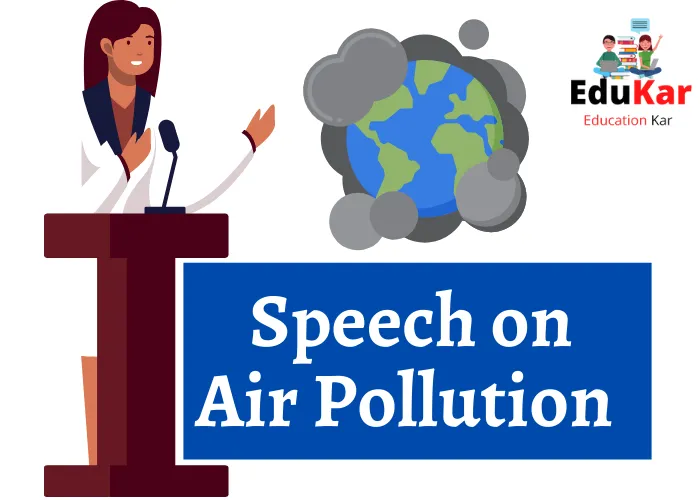
From the dangers of particulate matter to the importance of reducing emissions, our speech provides all the information you need to create a powerful call to action. Don’t miss out on this opportunity to educate and inspire your audience about the urgent need for clean air.
1st Speech on Air Pollution (25 min)
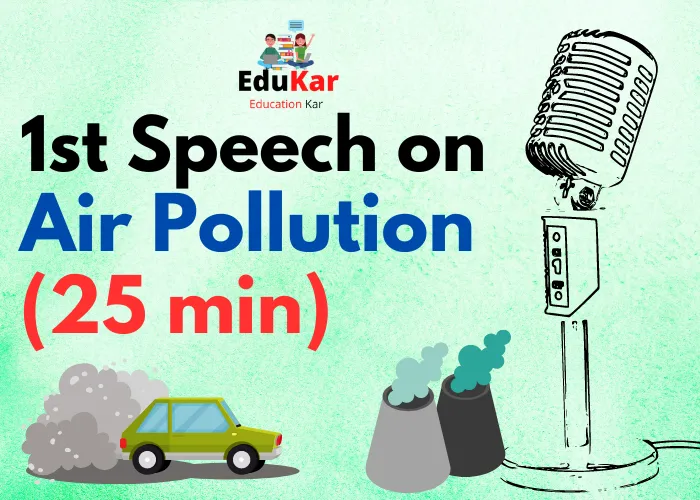
Dear fellow citizens,
I would like to bring to your attention an issue that is affecting the health of our environment and ourselves: air pollution. Air pollution is the presence of harmful substances in the air that we breathe. It is caused by human activities such as industrialization, transportation, and burning of fossil fuels. This issue is becoming more severe with time and it is our collective responsibility to take measures to curb it.
Air pollution has a significant impact on our health. Exposure to polluted air can cause respiratory problems such as asthma, bronchitis, and even lung cancer. It can also aggravate existing health conditions such as heart disease. Children and the elderly are especially vulnerable to the effects of air pollution. Additionally, air pollution has an impact on the environment, such as acid rain, ozone depletion, and global warming.
To address this issue, we must understand the causes and sources of air pollution. The primary sources of air pollution are transportation, industrial activities, and the burning of fossil fuels. Motor vehicles, in particular, are a significant source of air pollution. They emit harmful gases such as carbon monoxide, nitrogen oxides, and particulate matter. Industrial activities such as manufacturing, mining, and construction also emit harmful pollutants. The burning of fossil fuels such as coal, oil, and gas for energy production is another major contributor to air pollution.
To reduce air pollution, we can take individual actions such as reducing the use of personal vehicles, using public transportation, or carpooling. We can also reduce energy consumption in our homes and workplaces by using energy-efficient appliances and reducing unnecessary energy usage. Another way to reduce air pollution is to promote the use of renewable energy sources such as solar and wind power.
Government and policy makers have an important role to play in reducing air pollution. They can introduce and enforce regulations to reduce the emissions from transportation and industry. They can also promote the use of clean energy sources and incentivize industries to reduce their carbon footprint.
We can also take steps to mitigate the effects of air pollution. For example, we can wear masks to reduce exposure to harmful pollutants, especially when the air quality is poor. We can also plant more trees and greenery to help absorb pollutants and improve air quality. Additionally, we can support research and development of new technologies that can help reduce air pollution.
At the end, air pollution is a serious issue that affects our health and the environment. It is important for us to take individual actions and for governments and policy makers to implement regulations and promote clean energy sources to reduce air pollution. We must all work together to preserve the health of our environment and ourselves. Thank you.
2nd Speech on Air Pollution (20 min)
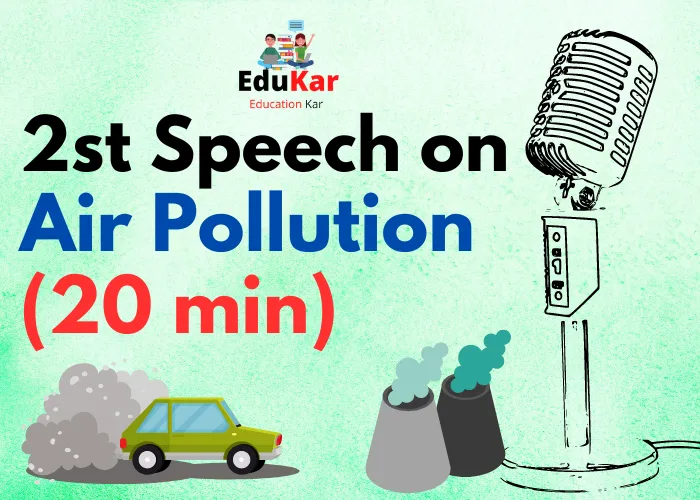
Good morning/afternoon/evening everyone,
Today, I would like to talk about one of the most pressing environmental issues that we face today – air pollution.
Air pollution is the presence of harmful substances in the air that we breathe. These harmful substances can include particulate matter, nitrogen oxides, sulfur dioxide, carbon monoxide, ozone, and many other pollutants. These pollutants are released into the air by a variety of sources, including industrial and transportation activities, as well as natural sources like wildfires and volcanic eruptions.
The effects of air pollution on our health and the environment are well-documented. Air pollution can cause a range of health problems, including respiratory illnesses like asthma, lung cancer, and heart disease. It can also harm the environment by causing acid rain, damaging crops, and contributing to climate change.
In many parts of the world, air pollution has become a major public health crisis. According to the World Health Organization, outdoor air pollution is responsible for around 4.2 million premature deaths each year. This makes air pollution one of the leading causes of death worldwide.
So, what can we do to address this problem? There are several steps that we can take at both the individual and societal levels.
At the individual level, we can take steps to reduce our own contribution to air pollution. This can include reducing our use of single-use plastics, using public transportation or carpooling instead of driving alone, and reducing our energy consumption by turning off lights and electronics when they are not in use.
At the societal level, governments and businesses can take steps to reduce air pollution on a larger scale. This can include implementing regulations to limit the amount of pollution that industries are allowed to emit, investing in cleaner forms of energy like wind and solar power, and improving public transportation infrastructure.
Ultimately, addressing air pollution will require a coordinated effort from individuals, governments, and businesses around the world. By working together, we can help to reduce the harmful effects of air pollution on our health and the environment.
In the end, air pollution is a serious problem that affects us all. We must take steps to reduce our own contribution to air pollution and work together to implement solutions at the societal level. By doing so, we can help to ensure a healthier and more sustainable future for ourselves and future generations.
Thank you for listening.
3rd Speech on Air Pollution (15 min)
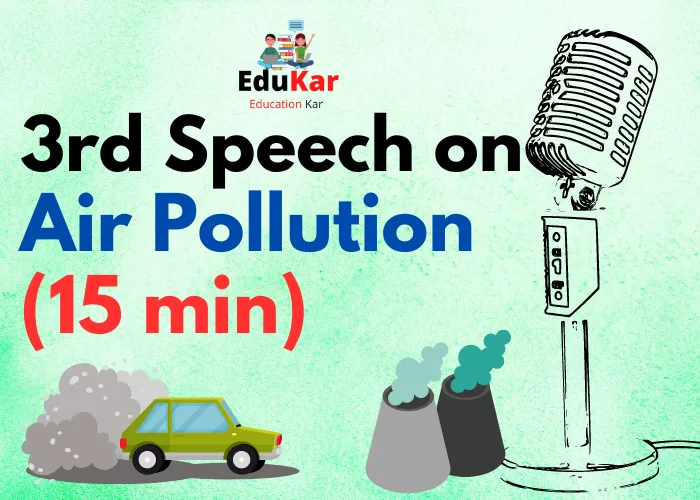
Ladies and gentlemen,
I stand before you today to talk about a problem that is affecting all of us, whether we realize it or not. The problem I’m referring to is air pollution. This is an issue that has been around for a long time, and it continues to get worse with each passing day. It’s time for us to take action and do something about it.
Air pollution is the presence of harmful substances in the air we breathe. These substances can come from a variety of sources, including factories, cars, and even natural events like wildfires. When we breathe in polluted air, it can have serious consequences for our health. It can cause respiratory problems, heart disease, and even cancer.
Unfortunately, air pollution is a problem that affects everyone, regardless of where they live. It’s a global issue that requires global solutions. We all have a responsibility to do our part to reduce air pollution.
One of the main sources of air pollution is transportation. Cars and trucks release pollutants into the air, including carbon monoxide, nitrogen oxides, and particulate matter. These pollutants can have a serious impact on our health, especially for those who live in cities with high levels of traffic.
To address this issue, we need to promote alternative forms of transportation. We can encourage people to use public transportation, ride bikes, or walk instead of driving their cars. We can also promote the use of electric or hybrid vehicles, which produce fewer emissions than traditional gasoline-powered cars.
Another major source of air pollution is industry. Factories and power plants release large amounts of pollutants into the air, including sulfur dioxide, nitrogen oxides, and particulate matter. These pollutants can have a serious impact on the health of people who live near these facilities.
To address this issue, we need to promote cleaner forms of energy. We can encourage the use of renewable energy sources like wind and solar power, which produce fewer emissions than fossil fuels. We can also promote energy efficiency, which can help reduce the amount of energy we need to produce.
Finally, we need to take action at the individual level to reduce air pollution. There are many simple things we can do to make a difference. We can carpool or use public transportation instead of driving alone. We can turn off lights and electronics when we’re not using them. We can reduce our use of single-use plastics, which can take hundreds of years to decompose.
In the end, air pollution is a serious problem that affects all of us. We need to take action to reduce the amount of pollutants we release into the air. This requires a global effort, but it also requires action at the individual level. We all have a responsibility to do our part to protect the air we breathe and the health of our planet. Thank you.
4th Speech on Air Pollution (10 min)
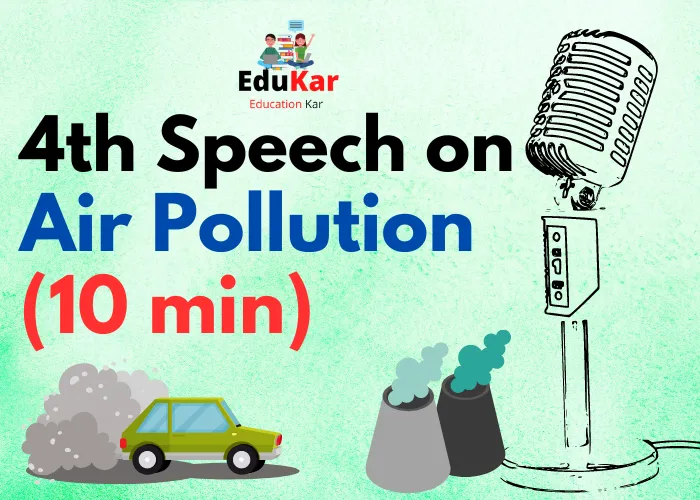
Good morning/afternoon/evening everyone,
I am here today to talk to you about a very important issue that is affecting our planet: air pollution. Air pollution is the presence of harmful substances in the air that we breathe. These substances can come from both human-made and natural sources, and they can have serious consequences for our health and the environment.
The main sources of air pollution include industrial activities, transportation, agriculture, and household activities. Factories, power plants, and vehicles emit large amounts of pollutants such as carbon monoxide, sulfur dioxide, and nitrogen oxides. These pollutants can cause respiratory problems, heart disease, and even cancer. Agricultural activities such as crop burning and the use of pesticides and fertilizers can also release harmful chemicals into the air.
Household activities such as cooking and heating with solid fuels like coal and wood can also contribute to air pollution. In many developing countries, people rely on these fuels for their daily needs, which can lead to indoor air pollution and respiratory problems.
Air pollution not only affects human health but also has a significant impact on the environment. It can cause acid rain, damage to crops, forests, and bodies of water. It also contributes to climate change, which is one of the biggest threats facing our planet.
To tackle air pollution, we need a collective effort from everyone. Governments, businesses, and individuals all have a role to play. Governments can create and enforce regulations to limit emissions from industrial activities and vehicles. They can also invest in renewable energy sources like wind and solar power.
Businesses can also take steps to reduce their impact on the environment by adopting sustainable practices and investing in clean technologies. For example, they can switch to electric vehicles, use energy-efficient lighting, and improve waste management.
As individuals, we can also make a difference by changing our daily habits. We can use public transportation, walk, or cycle instead of driving. We can also reduce our energy consumption by turning off lights and electronics when not in use and using energy-efficient appliances.
In conclusion, air pollution is a serious problem that requires immediate action from all of us. We need to work together to reduce emissions and protect our health and the environment. Let us all take responsibility for our actions and do our part to ensure a cleaner, healthier future for ourselves and generations to come. Thank you.
5th Speech on Air Pollution (5 min)
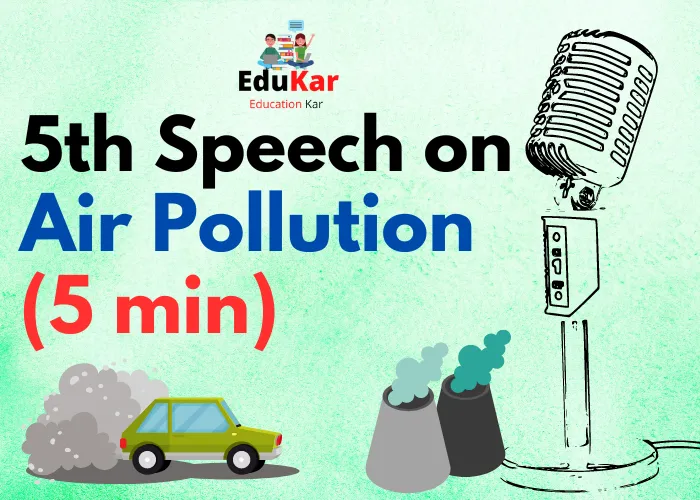
Ladies and gentlemen,
I stand before you today to discuss a topic that affects every single one of us – air pollution. The air we breathe is one of the most essential elements of our survival, and yet it is being threatened by pollution.
Air pollution has become a global problem, affecting both developed and developing countries. It is caused by a variety of factors, including transportation emissions, industrial activities, and energy production. This pollution harms our health and our environment, and it is our responsibility to take action to reduce it.
Firstly, air pollution poses a serious threat to our health. It can cause respiratory diseases, such as asthma and bronchitis, and can even lead to lung cancer. Children and elderly people are particularly vulnerable to the effects of air pollution. In addition, air pollution can also cause cardiovascular diseases and can even affect our cognitive function.
Secondly, air pollution has a worse impact on our environment. It can lead to acid rain, which damages crops, forests, and bodies of water. It can also contribute to climate change by increasing the levels of greenhouse gases in the atmosphere. This, in turn, can lead to more severe weather conditions such as hurricanes, floods, and droughts.
So, what can we do to reduce air pollution? The answer is simple – we must take action. Governments must implement regulations to reduce emissions from transportation and industrial activities. We can also take individual actions, such as using public transportation, walking or cycling instead of driving, and conserving energy in our homes.
Furthermore, we need to increase public awareness of the dangers of air pollution. Education campaigns can inform people about the health risks and environmental consequences of air pollution, and encourage them to take action to reduce their own emissions.
In th end, air pollution is a serious issue that affects us all. It poses a significant threat to our health and our environment, and it is our responsibility to take action to reduce it. By implementing regulations, taking individual actions, and increasing public awareness, we can create a cleaner, healthier world for ourselves and future generations.
Thank you.
FAQs
What is air pollution?
Air pollution is the presence of harmful substances in the air we breathe. These substances can include gases, particles, and biological molecules that can cause harm to human health and the environment.
What are the causes of air pollution?
Air pollution can have many different causes, including emissions from vehicles and factories, wildfires, agricultural activities, and household activities like cooking with solid fuels.
How does air pollution affect human health?
Air pollution can have a wide range of negative effects on human health, including respiratory problems, heart disease, stroke, and lung cancer. It can also exacerbate existing health conditions like asthma and allergies.
How does air pollution affect the environment?
Air pollution can have a variety of negative impacts on the environment, including damage to crops and other vegetation, acid rain, and harm to wildlife and ecosystems.
What are some ways to reduce air pollution?
There are many strategies that can be used to reduce air pollution, including reducing emissions from vehicles and industrial sources, promoting cleaner energy sources like wind and solar power, and improving public transportation infrastructure.
What can individuals do to help reduce air pollution?
Individuals can take a number of steps to reduce air pollution, such as using public transportation, driving less, using energy-efficient appliances, and reducing the use of single-use plastics.
Why is it important to address air pollution?
Air pollution poses a significant threat to human health and the environment, and addressing it is essential for promoting healthy and sustainable communities. Reducing air pollution can also help mitigate the impacts of climate change.
What is the government doing to address air pollution?
Governments at the local, national, and international levels are implementing a range of policies and regulations to reduce air pollution, including emissions standards for vehicles and industrial sources, investments in public transportation and clean energy, and public education campaigns to raise awareness about the issue.

![5 Best Speech on Clean India [Short & Long] Speech on Clean India](https://edukar.in/wp-content/uploads/2023/03/Speech-on-Clean-India.webp)
![5 Best Global Warming Speech [Short & Long] Global Warming Speech](https://edukar.in/wp-content/uploads/2023/03/Global-Warming-Speech.webp)
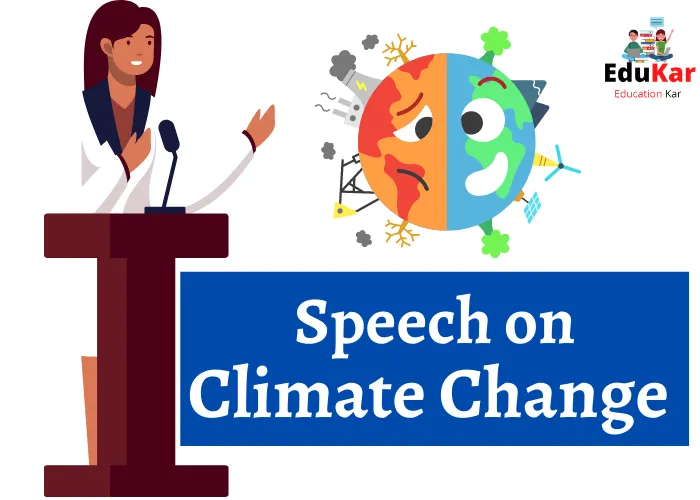
![Speech on Cleanliness [Short & Long] Speech on Cleanliness](https://edukar.in/wp-content/uploads/2023/03/Speech-on-Cleanliness.webp)
![5 Best Speech on Water [Short & Long] Speech on Water](https://edukar.in/wp-content/uploads/2023/03/Speech-on-Water.webp)
![5 Best Speech on Bhagat Singh [Short & Long] Bhagat Singh Speech](https://edukar.in/wp-content/uploads/2023/03/Bhagat-Singh-Speech.webp)
![Speech On Swami Vivekananda [Short & Long] Speech On Swami Vivekananda](https://edukar.in/wp-content/uploads/2023/03/Speech-On-Swami-Vivekananda.webp)
![Speech about Nature [Short & Long] Speech about Nature](https://edukar.in/wp-content/uploads/2023/03/Speech-about-Nature.webp)
![Speech on Success [Short & Long] Speech on Success](https://edukar.in/wp-content/uploads/2023/03/Speech-on-Success.webp)
![5 Best Speech on Jawaharlal Nehru[Short & Long] Jawaharlal Nehru Speech](https://edukar.in/wp-content/uploads/2023/03/Jawaharlal-Nehru-Speech.webp)
![5 Best Speech on APJ Abdul Kalam [Short & Long] APJ Abdul Kalam Speech](https://edukar.in/wp-content/uploads/2023/03/APJ-Abdul-Kalam-Speech.webp)

![Speech on Lal Bahadur Shastri [Short & Long] Speech-on-Lal-Bahadur-Shastri-](https://edukar.in/wp-content/uploads/2023/03/Speech-on-Lal-Bahadur-Shastri-.webp)
![Speech on Mahatma Gandhi [Short & Long] Speech on Mahatma Gandhi](https://edukar.in/wp-content/uploads/2023/03/Speech-on-Mahatma-Gandhi.webp)
![5 Best Speech on Shivaji Maharaj [Short & Long] Speech on Shivaji Maharaj](https://edukar.in/wp-content/uploads/2023/03/Speech-on-Shivaji-Maharaj.webp)
